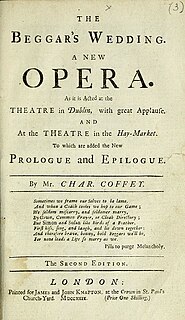Related Research Articles
The Female Fortune Teller is a 1726 comedy play by the British writer Charles Johnson. It is a reworking of Edward Ravenscroft's 1683 restoration comedy Dame Dobson.
Kensington Gardens is a 1719 comedy play by the Irish actor John Leigh. It is also known as Kensington Gardens, or, The Pretenders. It follows the attempts of several suitors to woo a wealthy rich widow, and the serious of complications that ensue.
A Woman's Revenge, or a Match in Newgate is a 1715 comedy play by the British writer Christopher Bullock. It was originally performed as an afterpiece to another work The Lucky Prodigal. With its Newgate Prison setting and cynical references to corruption, it could be regarded as a precursor to John Gay's hit The Beggar's Opera of a decade later.
Gabriel Odingsells (1690–1734) was a British playwright.
Love and Duty is a 1722 tragedy by the British writer John Sturmy.
Hob's Wedding is a 1720 farce by the Irish writer John Leigh.

The Village Opera is a 1729 ballad opera by the British writer Charles Johnson. It was part of a group of ballad operas produced in the wake of the great success of John Gay's The Beggar's Opera.

The Devil to Pay is a 1731 ballad opera by the Irish writer Charles Coffey and British writer John Mottley. Also known by the longer title The Devil to Pay: Or, The Wives Metamorphos'd, it was part of a group of ballad operas produced in the wake of the success of John Gay's The Beggar's Opera. The work is inspired by Thomas Jevon's 1686 play The Devil of a Wife.

The Beggar's Wedding is a 1729 ballad opera by the Irish writer Charles Coffey. Part of a boom in ballad operas following the success of John Gay's The Beggar's Opera, it originally premiered at the Smock Alley Theatre in Dublin in March 1729 before appearing in London at the Haymarket Theatre on 29 May 1729 The original Dublin cast included Richard Elrington.

Love in a Riddle is a 1729 ballad opera by the British actor-manager Colley Cibber. It was part of a boom in ballad operas inspired by the enormous success of John Gay's The Beggar's Opera the previous year.
The Fashionable Lady is a 1730 comedy play by James Ralph.
The Fall of the Earl of Essex is a 1731 tragedy by the writer James Ralph. It was inspired by Restoration-era drama The Unhappy Favourite by John Banks about the downfall of the Earl of Essex, a military commander and former favourite of Elizabeth I.
Sylvia is a 1730 ballad opera by the British writer George Lillo, written as part of a boom in ballad operas in the wake of John Gay's 1728 hit The Beggar's Opera.
Themistocles, the Lover of His Country is a 1729 tragedy by the Irish writer Samuel Madden. It is based on the life of the Ancient Greek general Themistocles.
A Tutor for the Beaus: Or Love in a Labyrinth is a 1737 comedy play by the British writer John Hewitt. It drew inspiration from an earlier one-act play Le Français à Londres by the French writer Louis de Boissy.
Belisarius is a 1724 tragedy by the British writer William Phillips. It is based on the life of the Byzantine general Belisarius, sometimes dubbed the "Last of the Romans".
The Fatal Legacy is a 1723 tragedy by the British writer Jane Robe. It was inspired by Jean Racine's 1664 play La Thébaïde. It concerns the children of Oedipus in Ancient Thebes.
The Married Philosopher is a 1732 comedy play by the writer John Kelly. It was inspired by the 1727 play Le Philosophe Marié by the French writer Philippe Néricault Destouches.
Philip of Macedon is a 1727 tragedy by the British writer David Lewis. It is set during the reign of Philip of Macedon.
The Different Widows is a 1703 comedy play by the British writer Mary Pix.